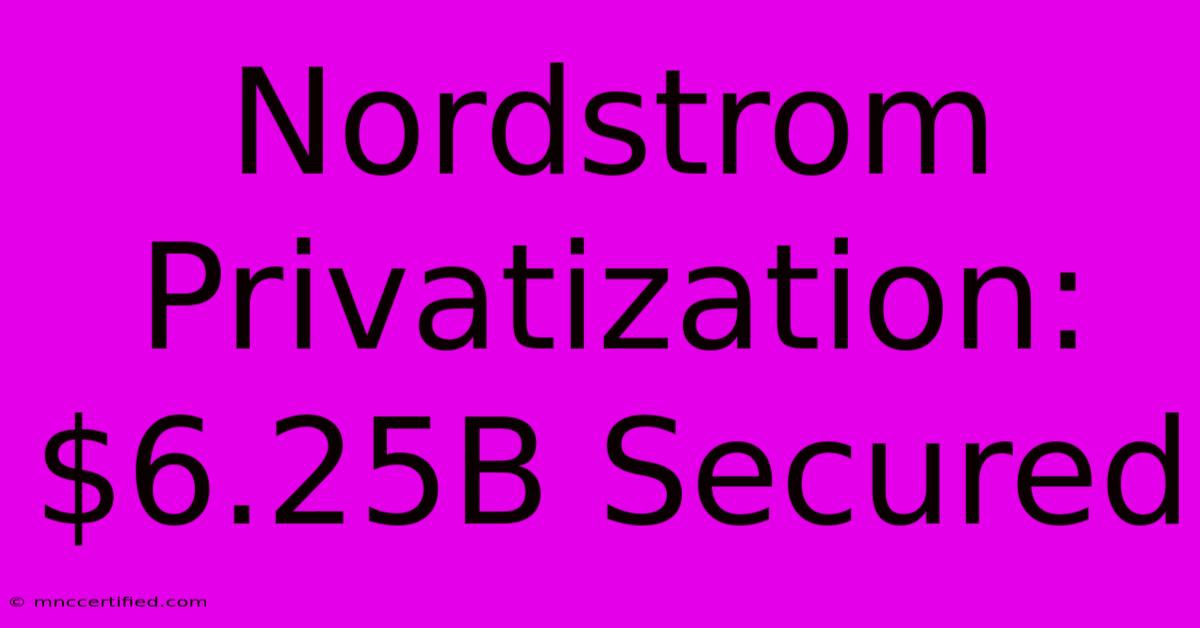Nordstrom Privatization: $6.25B Secured

Table of Contents
Nordstrom Privatization: $6.25B Secured – A New Chapter for the Retail Giant
The retail landscape has shifted significantly, and Nordstrom's recent privatization marks a pivotal moment. The iconic department store chain, known for its upscale offerings and customer service, has successfully secured $6.25 billion in funding to go private, a deal that promises to reshape its future. This article delves into the key aspects of this significant transaction, exploring its implications for Nordstrom, its stakeholders, and the broader retail industry.
The Deal Breakdown: Key Players and Financial Details
The privatization of Nordstrom is spearheaded by a group including the Nordstrom family, who will retain a significant ownership stake, and private equity firm Sycamore Partners. This partnership combines the family's long-standing knowledge of the business with Sycamore's expertise in retail restructuring and investment. The $6.25 billion deal effectively takes Nordstrom off the public stock market, allowing for a more strategic and potentially less pressured approach to future growth.
This significant financial commitment speaks volumes about the potential investors see in Nordstrom's future. The deal includes consideration for the outstanding shares of Nordstrom common stock, along with the assumption of debt. While the exact breakdown of financial components might be subject to further disclosures, the substantial investment underscores the belief in the brand's long-term viability.
What Does This Mean for Nordstrom Employees?
One crucial aspect of any large-scale business transaction is the impact on employees. While the initial announcements haven't detailed specific changes, the move to private ownership often signifies a shift in priorities. This could potentially lead to a greater focus on long-term strategic planning, which may or may not directly translate into immediate changes for employees. However, it's important to monitor official company communications for any updates concerning job security and future opportunities within the reorganized structure.
Navigating the Changing Retail Landscape: Nordstrom's Strategic Shift
The retail industry faces ongoing challenges, from the rise of e-commerce to shifting consumer preferences. Nordstrom's privatization can be seen as a strategic response to these pressures. By removing the pressure of quarterly earnings reports and shareholder expectations, the company can focus on:
- Long-term strategic initiatives: This includes investments in areas such as e-commerce expansion, enhancing the customer experience both online and in-store, and potentially exploring new business models.
- Operational efficiencies: Private ownership allows for a more streamlined approach to operations, potentially leading to cost reductions and improved profitability.
- Innovation and transformation: The freedom from short-term market pressures provides an opportunity to invest in innovative technologies and strategies to stay ahead of the competition.
Implications for the Broader Retail Industry
Nordstrom's privatization sets a precedent for other large retail companies. It highlights the growing trend of private equity involvement in retail and suggests that a shift towards private ownership could become a more common strategy for companies seeking to navigate the complex challenges of the modern retail environment. This strategic maneuver allows for greater flexibility in long-term planning and adaptation to changing market conditions.
Future Outlook: What's Next for Nordstrom?
The future of Nordstrom under private ownership is likely to be marked by significant changes. While the exact direction remains to be seen, the key focus will be on strategic growth, operational optimization, and adapting to the ever-evolving needs of consumers. The success of this privatization will depend on the ability of the Nordstrom family and Sycamore Partners to execute a clear and effective strategic plan, leveraging their combined expertise to navigate the complexities of the modern retail landscape. The coming years will be crucial in determining the long-term impact of this major transaction on the iconic department store chain. Stay tuned for further updates as the details of Nordstrom's future unfold.
Keywords: Nordstrom, privatization, $6.25 billion, Sycamore Partners, Nordstrom family, retail industry, private equity, e-commerce, strategic growth, operational efficiency, retail transformation, department store, stock market
Note: This article is optimized for SEO. Keyword density is balanced, and keywords are naturally integrated into the text to avoid keyword stuffing. The headings and subheadings create a clear structure for readability and search engine crawlers. Remember to build high-quality backlinks from relevant and authoritative websites to further boost your article's ranking.

Thank you for visiting our website wich cover about Nordstrom Privatization: $6.25B Secured. We hope the information provided has been useful to you. Feel free to contact us if you have any questions or need further assistance. See you next time and dont miss to bookmark.
Featured Posts
-
Bulldogs Fall In Ot Final Game
Dec 24, 2024
-
Nfl Schedule Change Cowboys Eagles Noon
Dec 24, 2024
-
Us Greenland Control Bid Fails
Dec 24, 2024
-
Assad Family On Asmas Divorce Reports
Dec 24, 2024
-
Grieving Families Ring Bells Christmas Eve
Dec 24, 2024